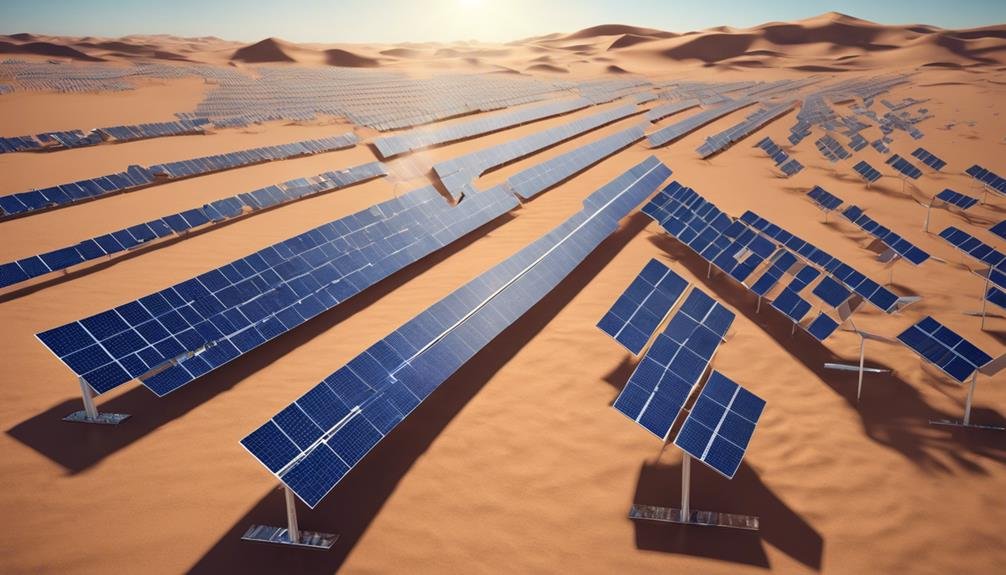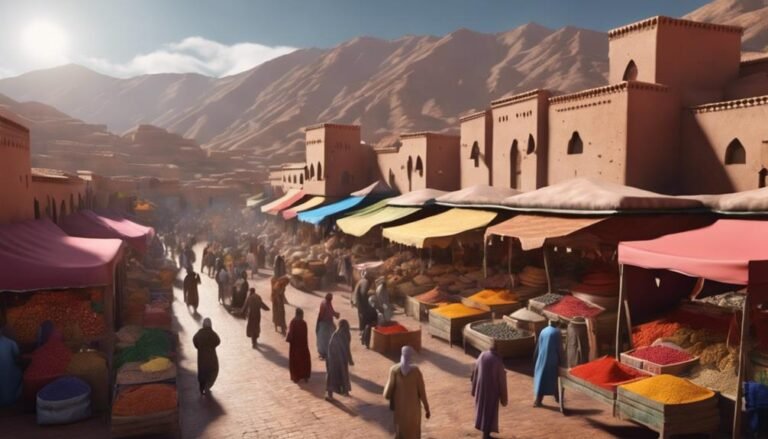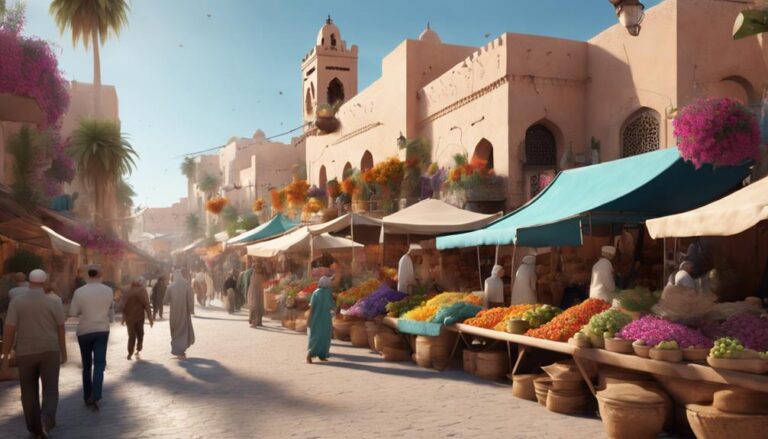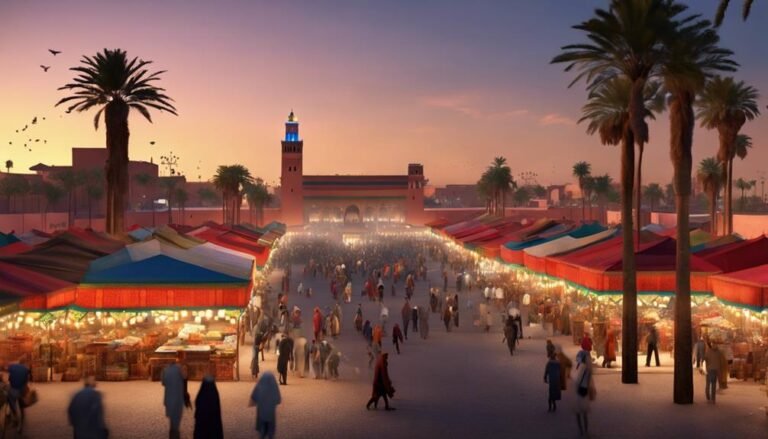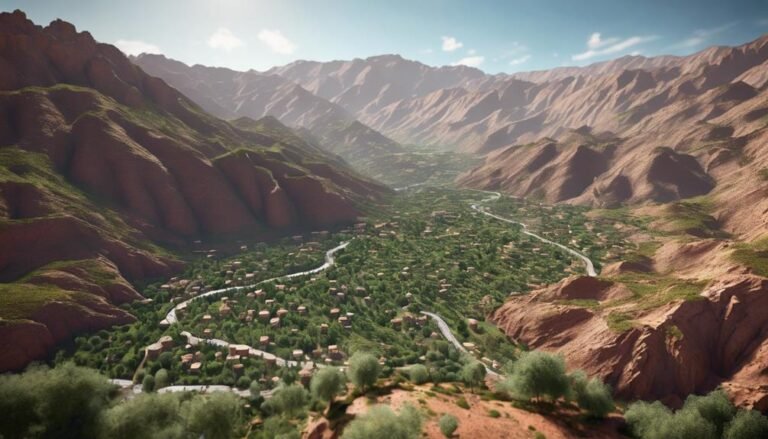In Morocco, renewable energy is thriving with a strategic framework emphasizing sustainability and reduced fossil fuel reliance. The regulatory environment cleverly combines incentives and regulations to lure investments and influence market trends. Investment in innovative wind technology and grid integration are top priorities. Solar energy stands out for efficiency enhancements and decentralized installations. Hydropower projects engage local communities for efficiency gains. Biomass and bioenergy diversify the energy mix sustainably. Geothermal potential promises further diversification. Integration of emerging technologies drives efficiency and decentralization. Challenges include grid stability and managing variable renewable sources effectively. Discover more about Morocco's renewable energy success!
Key Takeaways
- Morocco has a strategic framework promoting renewable energy for sustainable development.
- The country is reducing dependence on fossil fuels through clear policies and investments.
- Morocco is a leader in wind and solar energy, with a focus on efficiency and innovation.
- Hydropower projects are being expanded with community engagement opportunities.
- Emerging technologies like geothermal and smart grids are being integrated for a sustainable energy future.
Renewable Energy Policy in Morocco
Analyzing Morocco's renewable energy policy reveals a strategic framework aimed at promoting sustainable development and reducing dependence on fossil fuels. The country has made significant strides in this area, with clear policy implications driving the market dynamics. Morocco's regulatory framework plays a pivotal role in fostering a conducive environment for renewable energy projects. Through a combination of incentives and regulations, the government has successfully attracted investments in the renewable energy sector.
Industry collaborations are a key component of Morocco's renewable energy policy. The government has actively engaged with private sector stakeholders to drive innovation and efficiency in the industry. By partnering with local and international companies, Morocco has been able to leverage expertise and resources to accelerate the deployment of renewable energy technologies.
Wind Power Generation
Morocco's strategic framework for promoting sustainable development and reducing dependence on fossil fuels has paved the way for notable advancements in Wind Power Generation. When it comes to harnessing the power of the wind, Morocco has made remarkable progress. Here are some key points to take into account:
- Wind Turbine Technology Advancements: Morocco has been investing in cutting-edge wind turbine technology to maximize energy output and efficiency. These developments have greatly increased the country's wind power generation capacity.
- Offshore Wind Farms Expansion: Morocco has been actively exploring the potential of offshore wind farms to further boost its renewable energy production. The utilization of offshore wind resources offers promising opportunities for generating clean electricity.
- Integration of Wind Power into the Grid: Morocco has been focusing on incorporating wind power into its energy grid effectively. This involves optimizing the management of fluctuating wind power generation to guarantee a stable and reliable electricity supply for the country.
Solar Energy Development
Investing in solar energy infrastructure has positioned Morocco as a leading player in renewable energy innovation and sustainability. The country has made significant strides in enhancing solar energy efficiency through various initiatives. Morocco's focus on rooftop installations has been a key strategy to promote decentralized solar power generation. By encouraging the installation of solar panels on rooftops, the country isn't only maximizing the use of available space but also empowering individuals and businesses to contribute to clean energy production.
In recent years, Morocco has seen a considerable increase in rooftop installations, with both residential and commercial properties embracing solar energy solutions. This shift towards distributed solar power generation hasn't only helped in reducing reliance on traditional energy sources but has also contributed to lowering carbon emissions. The country's efforts in promoting solar energy efficiency and rooftop installations demonstrate a commitment to sustainable energy practices and a greener future.
Hydropower Projects Overview
To further bolster its renewable energy portfolio, Morocco has initiated ambitious hydropower projects aimed at harnessing the country's water resources for sustainable electricity generation. Here are three key aspects to bear in mind:
- Hydropower Efficiency Improvements:
Morocco is focusing on enhancing the efficiency of its hydropower plants through technological advancements and optimized operations. By maximizing the output from existing facilities, the country can generate more electricity from its water resources while minimizing environmental impacts.
- Hydropower Infrastructure Expansion:
With a focus on expanding its hydropower infrastructure, Morocco aims to increase its capacity for electricity generation. This expansion not only contributes to the country's renewable energy goals but also provides opportunities for community engagement. Involving local communities in the planning and development of hydropower projects can foster support and ensure sustainable outcomes.
- Community Engagement:
Engaging local communities in the decision-making processes related to hydropower projects is crucial for their success. By involving stakeholders from the beginning, Morocco can address concerns, promote transparency, and create shared benefits that contribute to the overall development of renewable energy in the country.
Biomass and Bioenergy Initiatives
With the increasing global focus on sustainable energy sources, biomass and bioenergy initiatives play a pivotal role in diversifying Morocco's renewable energy portfolio. Biomass utilization in Morocco has been steadily increasing, with a focus on enhancing efficiency through advanced technologies. The country has been investing in innovative processes to convert agricultural residues, animal waste, and forestry by-products into valuable bioenergy resources.
Morocco's bioenergy market is experiencing significant growth, driven by government initiatives and private sector investments. The country has been fostering innovation in bioenergy production, with a particular emphasis on sustainable practices and environmental impact reduction. These efforts have led to the development of bioenergy projects that contribute to both energy security and environmental sustainability.
Geothermal Potential in Morocco
Amidst the renewable energy landscape in Morocco, the geothermal potential remains an area of strategic interest for sustainable energy development. Here are three key points to take into account:
- Geothermal Exploration:
Morocco has shown promising signs of geothermal activity, particularly in regions like the Middle Atlas. Geologists have identified potential sites for further exploration to harness this renewable energy source efficiently.
- Renewable Energy Potential:
Geothermal energy presents a significant opportunity for diversifying Morocco's energy mix. With the country's commitment to reducing greenhouse gas emissions and increasing renewable energy capacity, tapping into geothermal resources could play an essential role in achieving these goals.
- Sustainability Impact:
Utilizing geothermal energy not only offers a clean and reliable source of power but also contributes to reducing dependence on fossil fuels. By investing in geothermal exploration and development, Morocco can bolster its renewable energy portfolio and move closer to a more sustainable future.
Renewable Energy Investment Trends
You should examine the investment growth rate in renewable energy projects in Morocco as it reveals the country's commitment to sustainability.
Analyzing the integration of emerging technologies in these investments can provide valuable insights into future energy trends.
Understanding these trends is essential for stakeholders looking to capitalize on the evolving renewable energy landscape in Morocco.
Investment Growth Rate
Renewable energy investment in Morocco has shown a significant growth rate in recent years, reflecting the country's commitment to sustainable energy development. This growth is fueled by several key factors:
- Investment Opportunities: The Moroccan government has created a conducive environment for renewable energy investments through attractive incentives and policies.
- Market Potential: With abundant solar and wind resources, Morocco has immense potential for renewable energy development, attracting investors looking to capitalize on the country's natural assets.
- Technology Advancements: Advances in renewable energy technologies have made projects more efficient and cost-effective, further enticing investment in this sector.
This upward trend in renewable energy investment underscores Morocco's position as a rising star in the global renewable energy landscape.
Emerging Technologies Integration
With the rapid evolution of renewable energy technologies, the integration of emerging innovations is reshaping the landscape of investment trends in Morocco. Smart grid technologies are playing a pivotal role in optimizing energy distribution by enabling efficient energy balancing across the grid. This integration allows for a more reliable and stable renewable energy network.
Additionally, the deployment of microgrids is gaining momentum in Morocco, facilitating the development of decentralized systems that enhance energy access and resilience. By embracing these emerging technologies, Morocco isn't only diversifying its energy mix but also fostering a more sustainable and robust renewable energy sector.
The strategic incorporation of smart grid technologies and microgrid deployment showcases Morocco's commitment to advancing renewable energy solutions and meeting its energy demands efficiently.
Grid Integration Challenges
You face significant grid stability concerns in Morocco as the country integrates more renewable energy sources into its power grid.
The transmission capacity constraints pose a challenge, especially with the increasing demand for electricity.
Managing the variability of renewable energy sources such as solar and wind power adds complexity to the grid integration process.
Grid Stability Concerns
Grid stability concerns arise due to the challenges faced in integrating renewable energy sources into the existing power grid infrastructure in Morocco.
Here are three key points to take into account:
- Renewable Energy Integration: The intermittency of renewable sources like solar and wind power can lead to grid instability if not properly managed.
- Energy Storage Solutions: Implementing effective energy storage systems is essential to balance the fluctuations in renewable energy generation and demand.
- Emerging Technologies Integration: Leveraging advanced grid management technologies such as smart grids and predictive analytics can enhance grid stability in the face of increasing renewable energy penetration.
Addressing grid stability concerns through improved renewable energy integration, energy storage solutions, and emerging technologies integration will be pivotal in ensuring a sustainable and reliable energy future for Morocco.
Transmission Capacity Constraints
Transmission capacity constraints present a significant challenge in integrating renewable energy sources into Morocco's power grid infrastructure. The current limitations hinder the smooth incorporation of renewable energy.
To address this issue, capacity expansion and infrastructure upgrades are imperative. Increasing the transmission network's capacity will enable efficient electricity transfer from renewable sources to areas of high demand.
Upgrading the infrastructure will enhance grid stability and reliability, ensuring a seamless shift to a more renewable-oriented energy system. By investing in these improvements, Morocco can overcome transmission capacity constraints and pave the way for a more sustainable energy future.
Variable Renewable Energy Sources
The integration of variable renewable energy sources presents significant challenges in optimizing the efficiency and reliability of Morocco's power grid infrastructure.
To address these challenges effectively, consider the following:
- Intermittency Management: Developing robust systems for managing the fluctuations in energy production from sources like solar and wind to guarantee a stable supply to the grid.
- Grid Modernization: Upgrading the grid infrastructure to accommodate the variability of renewable sources and enhance overall system flexibility.
- Energy Efficiency: Implementing technologies and practices that improve the efficiency of energy transmission and distribution processes to minimize losses and enhance grid performance.
Energy Storage Solutions
To guarantee the efficient integration of renewable energy sources, exploring innovative energy storage solutions is imperative for Morocco's sustainable energy future. Energy storage solutions play a pivotal role in supporting the development of microgrids, which are essential for enhancing grid stability and resilience in the face of intermittent renewable energy generation. Morocco has been actively investing in energy storage technologies to address the challenges posed by the variability of renewable sources like solar and wind.
The deployment of energy storage solutions enables the storage of excess energy generated during peak production periods for later use during periods of low renewable energy generation. This helps in balancing the supply-demand dynamics and ensures a reliable energy supply. Additionally, energy storage solutions facilitate the integration of distributed renewable energy resources into the grid, promoting a more decentralized and resilient energy system.
As Morocco continues to advance its microgrid development and renewable energy capacity, further innovation and investment in energy storage solutions will be essential for maximizing the benefits of renewable energy sources and achieving a sustainable energy transformation.
Future Outlook and Opportunities
Exploring future outlook and opportunities in renewable energy development in Morocco reveals promising avenues for sustainable growth and innovation. The following key points shed light on the exciting prospects in this sector:
- Market Opportunities:
With the increasing global focus on sustainability and renewable energy sources, Morocco stands poised to capitalize on growing market opportunities. The country's strategic geographical location offers a gateway to both European and African markets, providing a competitive edge in renewable energy exports.
- Technological Advancements:
Morocco has been proactive in embracing technological advancements in the renewable energy sector. Investments in renewable energy research and development have led to improved efficiency in solar and wind power generation, making the country a frontrunner in innovative clean energy solutions.
- Policy Support:
The Moroccan government's commitment to renewable energy through supportive policies and incentives has created a conducive environment for investment and growth. Initiatives like the National Energy Strategy for 2030 aim to further bolster the renewable energy sector, fostering a sustainable energy landscape for the future.
Conclusion
You've seen how Morocco has made significant strides in renewable energy, like a well-oiled machine powering forward. With ambitious policies, diverse projects, and growing investments, the country is blazing a trail towards a greener future.
Despite challenges with grid integration, energy storage solutions are on the horizon. As Morocco continues to harness its natural resources, the future looks bright for sustainable energy development in the kingdom.

The Editorial Team is a passionate group of Morocco enthusiasts dedicated to sharing the beauty, culture, and wonders of this captivating country. With diverse backgrounds and a deep love for travel, we strive to bring you engaging and informative content that inspires your Moroccan adventures. From uncovering hidden gems and sharing local insights to exploring mouthwatering cuisine and showcasing the vibrant lifestyle, our team is committed to providing you with valuable resources and exciting stories that enhance your exploration of Morocco. Join us on this journey as we celebrate the rich heritage and unforgettable experiences that make Morocco truly special.

